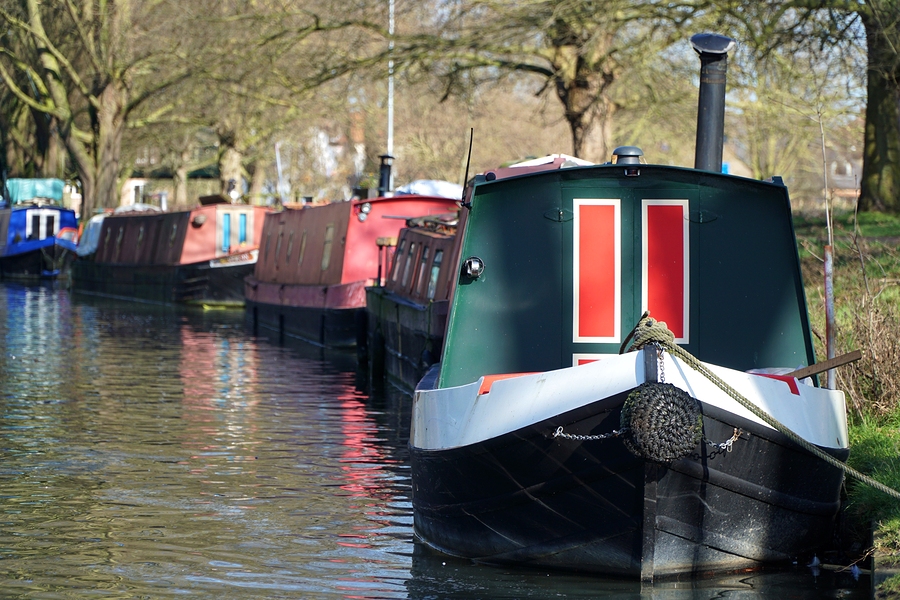Narrow Boat Living: an option for downsizing
Each year, many people enjoy the tranquil, unhurried life of the inland waterways of the UK, spending their holidays on rented narrow boats or on their own narrow boat.
But a growing number of people are electing to live on a narrow boat on a rather more permanent basis – either continuously cruising the canals or staying more or less at one location.
So does this watery way forward represent one viable option for “downsizers” – and, if so, what are the costs involved?
First, let’s look at the capital investment.
A new boat suitable for living aboard will cost you upwards of £100,000 – and splashing out £200,000 is certainly possible. For that you will get a boat that you have helped to design and will better suit your requirements.
But you can get started for far less: budget boats from around £65,000 are also available, but will offer a more basic standard of comfort, while “previously enjoyed” boats are also available at anything from £30,000 upwards. That said, at the lower end of this price range the boats will be tired and possibly in need of some refurbishment. You would certainly be lucky to find a boat that meets your requirements exactly on that sort of shoestring.
Running costs
There’s no such thing as a free launch, so just keeping yourself afloat will also set you back a tidy sum.
- Moorings: a permanent residential mooring will cost from around £2,000 to £4,000 plus depending on the area of the country – moorings near London are naturally more expensive and also harder to find.
- Licence: all boats need a licence from the Canal and River Trust. This will cost around £900 per annum depending on the length of the boat.
- Insurance: all boats need insurance in order to obtain a licence. This will cost from £200 to £400 per annum.
- Boat Safety Scheme: all boats need to have a BSS examination every four years – a bit like an MOT – and that’s £160.
- Then there is the general maintenance of the boat. Blacking the hull every couple of years will cost around £600 depending on the length of the boat. Engine servicing and minor repairs have to be budgeted for too. The superstructure is generally steel and will need repainting from time to time – this can cost up to £8,000.
- If you are travelling rather than staying put, you’ll need to top up with diesel, and that can add up if you do long distances: allow between 7 and 13 mile per gallon depending on how many locks you are navigating.
So what are the pluses?
- The possibility of releasing equity from your property could ease your financial anxiety.
- Quality of life: exploring the inland waterways from our industrial heritage to the quiet, open countryside.
And what are the minuses?
- Obtaining supplies when not moored near shops or marinas. As well as food you will need gas, diesel and possibly coal. These can be difficult to get to the boat in winter months if ice, snow, or mud stand between you and your nearest supplier.
Conclusion
Many folk jump into this way of life without ever having been on a narrow boat, others having enjoyed a week or two on holiday. It is worth hiring a boat for a longer period if you are thinking of making it a permanent way of life to make sure that this life really is for you.
In financial terms, make sure you do all your sums first – check out all the very helpful forums available. Buying a newer boat will take more of a bite out of your capital but maintenance costs will probably be lower. And as annual running costs will tot up, do make sure you have sufficient income to cope with that – and a “sinking fund” to allow for any major work required.
Remember, you can also use RetireEasy LifePlan — the financial planner that lets you take control of your future — to test out your long-term prospects of keeping your finances afloat!
Written by Chris Collinson
Disclaimer
The contents of this article are for reference purposes only and do not constitute financial or legal advice. Independent financial or legal advice should be sought in relation to any specific matter. Articles are published by us without any knowledge or notice of the circumstances in which you or anyone else may use or rely on articles or any copy of the information, guidance or documents obtained from articles. We operate and publish articles without undertaking or accepting any duty of care or responsibility for articles or their contents, services or facilities. You undertake to rely on them entirely at your own risk, and without recourse to us. No assurance of the quality of articles is given or undertaken (whether as to accuracy, completeness, fitness for any purpose, conformance to any description or sample, or otherwise), or as to the timeliness of the publication.






















